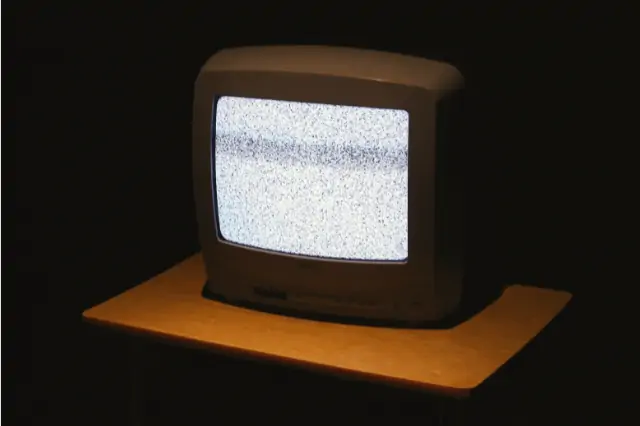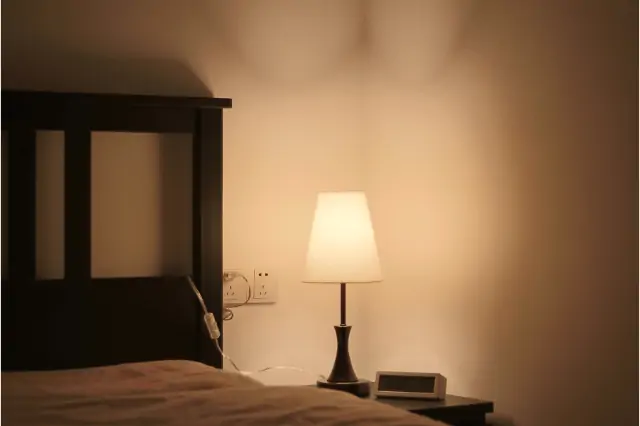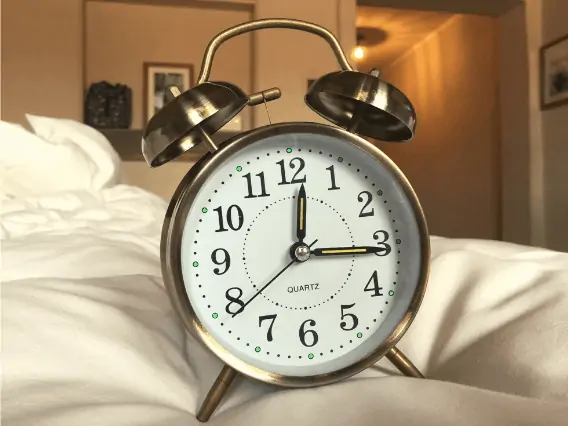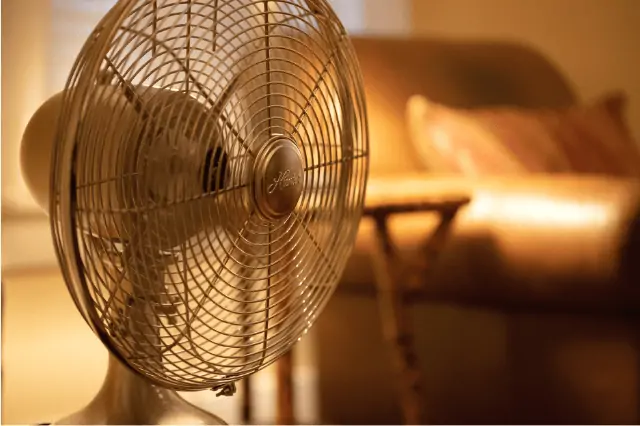In the past, I’ve had trouble getting to sleep due to distracting noise pollution. Researching solutions led me to white noise and to the question, “How does white noise affect sleep?”
If you’ve wondered the same, here’s a quick answer:
White noise affects sleep by reducing the time it takes you to drop off. This is because it masks background noise by playing sounds across the audible spectrum. Rather than being distracting, it stops your brain from focusing on one thing in particular.
In this article, I’ll cover the topic of using white noise to sleep in detail. First, I’ll look at how the machines work before moving onto some studies that show how it affects sleep.
Hopefully, by the end you’ll have all the information you need to sleep soundly!
How do White Noise Machines Work?
White noise works by playing every audible frequency in a random pattern. It plays these frequencies at the same amplitude and sounds like a consistent humming or crackling noise.
Generally, white noise is compared to the audible version of TV or radio static. But there’s every chance most people don’t have that as a frame of reference any more!

By playing all audible frequencies, it masks sounds that your brain focuses on. Surprisingly, having a wall of noise like this isn’t distracting for most people. It can actually aid concentration.
In fact, various studies have proven a link between white noise and improved concentration and learning. Of course, we’re thinking about how white noise affects sleep, but the reasoning remains the same.
To better understand white noise, it’s worth looking at 2 key terms: frequency and amplitude.
I recommend watching this video on white noise for more information.
Frequency
Also known as pitch, frequency refers to the number of times a sound wave “repeats” per second. We measure frequency in hertz (Hz). Low-frequency sound waves are low pitch, whereas high-frequency sound waves are high pitch.
An adult can hear between 20Hz (low frequency) and 20,000Hz (high frequency). As we get older, we lose our ability to hear high-frequency sound waves.
So, a white noise machine plays sounds between 20Hz and 20kHz.
Amplitude
Amplitude is the strength of a sound wave and relates to volume. It’s not the only factor that determines volume (loudness) but it’s the most important.
We measure volume in decibels (dB), which is a logarithmic scale. This means that every 10dB increase equates to a doubling of perceived loudness.
White noise machines play different frequency sounds at the same volume. As I discuss in my post on noise colors, this differs from pink noise and brown noise. Pink and Brown play low frequencies at higher amplitudes.
Different frequencies at the same volume creates a mixture of sounds similar to that of restaurant background noise. It drowns out sounds that have lower amplitude than that of the background noise.
Do White Noise Machines Work?
White noise machines work for everything from concentration and memory retention to a sleep aid. I’ll cover some scientific studies in the next section that explain this in more detail.
First, it’s worth mentioning that white noise machines for sleep don’t help everyone. Some people do find them distracting, but they can be useful for:
- Babies
- A sleep aid while traveling
- People with tinnitus
- People sleeping in noisy locations
In short, if it takes you longer than average to fall asleep, consider trying a white noise machine. It might not work but it’s worth a go considering white noise machines don’t cost much.
You can check out my review of the best white noise machines for sleeping to help you make a choice.
How does White Noise Affect Sleep?
White noise machines affect the quality of sleep by helping you fall asleep faster. They also make it more likely for you to stay asleep, particularly if you’re a light sleeper. This is because it lowers the chance of you getting woken up by a distracting noise.
To Fall Asleep Faster & Stay Asleep
White noise is helpful for making you fall asleep faster. This is especially true if you’re someone who can’t sleep without background noise. Of course, there’s a difference between relaxing noise and distracting noise.

For example, some people like falling asleep to the sound of rain, which is one type of white noise. Others enjoy audiobooks. But both of these are different from, say, a noisy neighbor or street noise.
There are plenty of studies that prove a link between white noise and the speed at which people fall asleep. A study led on 20 healthy subjects assessed the effect of white noise on falling asleep. It showed that people got to sleep 38% quicker with white noise than with silence.
Another experiment looked at the use of white noise in hospitals to aid patient sleep. It found that patients fell asleep faster and stayed asleep longer with white noise on.
3 Reasons White Noise Helps to Fall Asleep
White noise helps you to fall asleep because it masks background noises. In turn, it makes your bedroom appear quieter. This is because it’s not the volume of noises that we necessarily find distracting. It’s rather the change from silence to noise.
For example, a door slamming or dog barking is more likely to wake you up than the constant sound of your neighbor’s TV.
But there are several other reasons why white noise can help with sleep:
1. Conditions your Brain to Start Sleeping
This is true of anything you play when falling asleep. Over time, your brain will take the sound as a signal to begin relaxing. This is simple classical conditioning.
White noise helped participants in masking sounds. In the same time, they also developed a habit in response. After a few days, their brains used it as a signal to begin relaxing.

2. The Right Level of Annoying
One study found different brain reactions to white noise and identifiable noises. The brain registers lower-amplitude responses to white noise than pure tones (identifiable noises). It suggests that white noise works as a sleep aid because it’s less annoying than pure tones. But it’s not annoying enough for our brains to register.
Our brains have an innate response to potential warning signals. As a result, it notices sudden noises more than consistent ones. White noise gives your brain a soothing sound that “calms” your alert response system.
3. To Initiate a Bedtime Routine
Getting enough sleep is important, and one of the best ways to do so is with a consistent nightly routine. A study in Nature found that a regular routine led to lower rates of heart and mental disease, and obesity.
Of course, we can’t credit this entirely to white noise as a sleep aid. But, as mentioned in point 1, you can use white noise to condition your brain into knowing it’s time for sleep. Starting your noise machine every night can contribute to a consistent bedtime routine.

Does White Noise Help You Sleep Better?
Staying asleep can be difficult in noisy environments. Various studies have shown a link between environmental noise and sleep disturbance. Poor sleep quality can lead to a range of health complications.
As mentioned, white noise helps you to stay asleep because it provides sound at a consistent volume that masks sudden sounds. The noise being the same volume is the most important aspect for staying asleep.
A roundup study by Science Direct reviewed 38 separate studies. It found plenty of evidence linking consistent background noise to better sleep. One thing the study didn’t consider was white noise as a distraction when sleeping.
This isn’t a particularly common issue, but what might affect you is your white noise machine turning off at night. Some include a timer and this sudden absence of white noise could be enough to wake up some light sleepers.
White Noise & Sleep Quality
This study found that playing white noise puts the brain into a deeper, more relaxed sleep. It tested somatosensory evoked responses (SSER) in newborn infants. SSER consists in measuring the central nervous system activity with an electrical current.
Results showed white noise increased the latency between the stimulus and the response. This means that it took longer for the body to respond to the mild electric current, meaning the body was essentially more relaxed.

Does it Work on Everyone
It’s fairly well proven that white noise will both help you fall asleep and stay asleep. However, these studies also highlighted that white noise doesn’t work for everyone.
For example, the study monitoring white noise as a sleep aid also found white noise didn’t help all participants. It did help a majority though, so your chances of benefiting from white noise are quite high.
Why People Can’t Sleep Without Noise
A Consumer Report survey concluded that 44% of Americans were problem sleepers. These problems included:
- Not being able to fall asleep
- Not staying asleep
- Waking up too early
1 in 5 people in the survey turned to medication to help solve the problem. Others tried sleeping with a fan or another kind of background noise.

With more and more people turning to noise machines as sleeping pills, why is it that some people can’t sleep without noise?
Well, there are plenty of reasons. The most common include noise pollution and health complications, such as tinnitus or mental health issues.
Of course, some people are just light sleepers and so find any noise pollution – however minor – to be distracting. White noise can help light sleepers because it masks those distracting sounds.
If you’re someone who can’t sleep without background noise, your main options are sleeping with a fan or using a white noise machine.
But is this entirely without risk?
Is White Noise Bad for You?
Generally speaking, using white noise as a sleep aid isn’t bad for you. It’s not entirely without risk, but these risks are minor if you use the white noise machine properly.
For example, ensure your white noise machine doesn’t play at a volume over 70dB, as this can cause hearing damage. I discuss correct usage of white noise machines in my review article for more information.
But, one of the potential issues of white noise is that it hasn’t been studied long term. Professor Mathias Basner, a psychiatry professor at the University of Pennsylvania, was a reviewer of the 38 studies quoted above. He stated that playing sound all night could prevent the brain from switching off in the right way.
Our brains need time without any sensory input to recover. Even when we’re asleep, our ears transmit information to the brain for processing. So, constantly feeding information, even something like white noise, could have an impact.
Professor Mathias did mention this hasn’t yet been tested, though.
Another very recent study found that white noise as a treatment for tinnitus could have side effects. It found that playing white noise caused the brain to rewire itself in negative ways. This causing the brain to show faster aging.
However, this study is the first of its kind to find these results. So, it shouldn’t be considered fact until other studies corroborate it.
So, is white noise bad for you? Generally, no. Like anything else, there are risks but it’s fair to say the benefits outweigh them at this point. Of course, it’s important to remain aware of any future developments.
Conclusion
I hope this article has given you useful information on white noise sleep research.
As it stands, most research favors white noise as a sleep aid. It’s especially true in distracting environments.
While some potential negatives exist, these need to be studied in much more detail before we can consider them to be health risks.
The most important thing is still for us to get enough sleep every night, and if white noise helps you sleep, go for it.
What’s your favorite method for falling asleep at night? Do you have any tips for fellow light sleepers? Let me know below.
